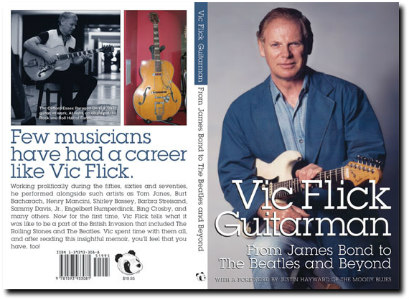
HOMEWesley Britton’s Books,
|
Spies on FilmSpies on Television & RadioSpies in History & LiteratureThe James Bond Files |
|
The James Bond Files ~ Re-discovering 007, the
British Invasion, and “Swinging London”, Too
– Vic Flick and the Guitar That Changed a Generation
By Wesley Britton 
Vic Flick’s autobiography – Guitarman The 2008 Ian Fleming Centenary was a great year for book lovers. We enjoyed reissues of the classics, experienced new novels, and turned the pages of reminiscences written by virtually everyone who was ever associated with any 007 book or film. But, for me, the best-kept secret of 2008 was the publication of Guitarman (Bear Manor Media), the long overdue memoir by legendary guitarist, Vic Flick. Somehow, in the avalanche of Bondiana, to coin a term, Guitarman didn’t get the notice it deserved. Perhaps this is because, outside of a few circles, Flick just isn’t the brand-name he should be by now. I can’t explain this. I can’t count the number of times I’d show a friend a copy of Guitarman and hear, “Who’s Vic Flick?” Well, now’s a good time to find out. Of course, Bondians know who Vic Flick is and what his role in the 007 movie realm involved. Or at least they think they know, having read many accounts of how the most famous movie theme of all time came to be. Musicians know who Vic Flick is, as few guitarists alive haven’t been inspired or influenced by Vic’s work, even when they didn’t know they had grown up listening to records featuring one of the most prolific studio musicians of the 1960s British Invasion. (Justin Hayward, one of the original Moody Blues, wrote the very admiring introduction for Guitarman.) During the heady years of “Swinging London,” as Vic chronicles in Guitarman, he played on so many hits, he can’t remember all the sessions he worked on. For but a few examples, you can hear him on Peter and Gordon’s “World Without Love” and the hits of Petula Clark. Beatle fans heard Vic on the Hard Day’s Night soundtrack as producer George Martin tapped Vic to play “This Boy (Ringo’s Theme)” precisely because Martin wanted to capture the Bond guitar sound. Even today, few Baby Boomers know that the faces on many of those album covers didn’t belong to the actual musicians who performed the songs on the vinyl inside. Vic Flick was one of these unheralded studio musicians who remembers watching Herman’s Hermits sitting in the control booth listening to the hits he’d help record as the Hermits began to learn the songs they’d perform live for all those adoring fans. Such stories are what make Guitarman such a rich read. In addition, Vic Flick is no slouch as a storyteller. He begins by describing his post-war years when he became a professional musician and shares his memories of his earliest tours with the likes of the John Barry 7 and Paul Anka. Then he provides personal and often poignant sketches of just how the record industry worked in the 1960s, and how quirky producers and often bemused musicians spent hours laying down the soundtrack of a generation. When he wasn’t in the studio, Vic was either backing the top stars of the times on the road or on television shows like Top of the Pops. In short, it’s one thing to investigate the many histories and biographies of the singers and personalities who rose to fame on radio, TV, and on the large screen – but it’s even more fascinating to discover the behind-the-scenes stories of how such fame and fortune came about, at least for those who had the good fortune to be backed by the likes of Vic Flick. So, for anyone who ever owned a turntable, watched any Bond movie, or simply likes well-written autobiographies told with wit and insight, Guitarman is a title not to be overlooked. Now, as Spywise.net is your place to discover spy nuggets not available anywhere else on the net, we thought we’d share a few excerpts from Guitarman that won’t give away any of the highlights you’ll have to read for yourself in Vic’s book. (For example, did you know Vic and Eric Clapton worked together on an instrumental intended to be the theme for License to Kill, a Michael Kamen project that was never released?) Bearing in mind that Vic’s contributions to the Bond canon go far beyond the 007 theme, we thought we’d share two stories involving another highly-regarded track in the John Barry/Vic Flick legacy, the music for the gypsy encampment scene in From Russia With Love. According to Vic –
But that wasn’t the last time Vic played those notes –
One pound extra? Well, remember Vic didn’t exactly get rich from his performance on the original James Bond theme. While Monty Norman and John Barry earn royalties to the present day, Vic says he got “about seven pounds ten shillings.” So, it’s now our turn to help remedy this situation – by adding Guitarman to our libraries and spending some enjoyable hours with one of the most significant unsung heroes of the 1960s – and beyond. You can find out more about Guitarman at ~
Amazon U.S.
P.S. – This month (December, 2006), Amazon is claiming that Vic’s great solo CD, James Bond Now, is not available. Well, it is – and you can get it autographed by the “guitarman” himself! James Bond Now, a wonderful collection of Vic’s reworkings of classic Bond tunes along with original compositions, can be ordered from Vic for $15.00 including shipping and handling by eMailing Vic direct at ~ For more about Vic and spy guitar, see also “Spy Guitar – From Vic Flick to Spy-Fi”, posted in The James Bond Files section of this website. |